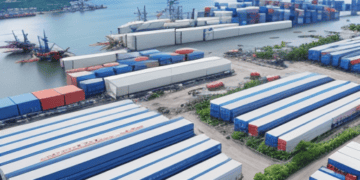In recent years, the Philippine supply chain sector has been under a microscope, particularly in light of the challenges and uncertainties introduced by the global pandemic. The sector has traditionally been a critical area of focus, but the last few years have underscored the need for innovative solutions to overcome the setbacks faced in 2020 and beyond. The pandemic has not only highlighted vulnerabilities within the global economy but also prompted a reevaluation of strategies to reclaim lost growth opportunities.
A significant development in this evolving landscape has been the promotion of Mary Jean Pacheco to undersecretary of the Department of Trade and Industry (DTI), where she is now leading the agency’s regional operations. Pacheco’s elevation is noteworthy, given her prior commitment to the logistics sector as assistant secretary of the Competitiveness and Ease of Doing Business Group since 2016. Her inaugural presentation as undersecretary, themed around adopting a “supply chain lens,” has sparked considerable interest among industry stakeholders.
The concept of viewing economic and sectoral challenges through a supply chain lens has gained traction. It aims to broaden the understanding of the sector’s significance, not only in terms of profitability but also in its capacity to contribute value to the broader economy. This approach seeks to highlight the interconnectedness of various industry segments and the collective efforts required to address shared challenges and opportunities.
Undersecretary Pacheco’s new role involves integrating the supply chain perspective into regional industry roadmaps, an initiative aimed at boosting local industries and, by extension, the national economy. This strategy is particularly relevant as the current administration focuses on enhancing food security, self-sufficiency, and economic prosperity across different regions of the country.
Moreover, the digital consumption-driven economy presents both challenges and opportunities, especially in rural areas where infrastructure limitations persist. The retail sector’s expansion into new formats and markets indicates a growing consumer appetite, raising questions about inclusive growth and the integration of all sectors into the economic fold.
The Supply Chain Management Association of the Philippines (SCMAP) emphasizes the foundational role of the supply chain in business and economic systems. At its core, the supply chain affects how customers receive products—timing, condition, and pricing are all influenced by various factors, including demand planning, resource mobilization, manufacturing processes, and delivery networks. Addressing issues such as agricultural productivity and import reliance through a supply chain perspective can lead to more effective and inclusive solutions.
Collaboration between government agencies and the private sector is crucial for addressing supply chain challenges. Agencies such as the Department of Public Works and Highways, the Department of Transportation, and the Department of Agriculture play key roles in developing infrastructure, transport networks, and agricultural productivity, respectively. A unified approach that leverages the strengths of both sectors is essential for sustainable progress.
The Philippine supply chain sector is at a crossroads, facing the need to adapt to post-pandemic realities while seizing opportunities for growth and innovation. Through concerted efforts and a comprehensive understanding of the supply chain’s role, the sector can navigate these challenges and contribute to the country’s economic resilience and prosperity.
As the sector moves forward, the emphasis on digital transformation and technological integration becomes increasingly important. The digital economy is not just reshaping consumer behavior but also redefining the logistics and supply chain management practices. The adoption of a supply chain lens in policy-making and industry strategy formulation is instrumental in harnessing the potential of digitalization to enhance efficiency, transparency, and sustainability across the supply chain.
The initiative to view regional development through a supply chain perspective is a strategic move towards decentralizing economic growth and ensuring that benefits are more evenly distributed across the country. By focusing on elevating local industries and integrating them into national and global supply chains, there is a unique opportunity to address longstanding challenges related to infrastructure, market access, and resource utilization. This approach not only supports economic diversification but also fosters resilience against future disruptions.
Engagement with various industry associations and stakeholders is a critical component of this strategy. By bringing together diverse sectors under a unified agenda, it is possible to identify synergies and collaborative opportunities that can drive innovation and growth. This inclusive approach ensures that the solutions and strategies developed are comprehensive and take into account the multifaceted nature of supply chain challenges.
The expansion of the retail sector into emerging markets and formats highlights the dynamic nature of consumer demand and the need for supply chains to be adaptable and responsive. The focus on including everyone in economic growth initiatives requires a holistic understanding of the supply chain—from production and procurement to distribution and retail. Ensuring that all segments of the population benefit from economic advancements necessitates targeted efforts to overcome barriers to access and participation.
In conclusion, the Philippine supply chain sector is navigating a period of significant transformation. The pandemic has acted as a catalyst for change, prompting a reevaluation of traditional practices and the exploration of new approaches to ensure growth and sustainability. The adoption of a supply chain lens by government agencies and industry leaders reflects a comprehensive strategy to address the complexities of modern supply chains. By fostering collaboration, embracing digitalization, and focusing on inclusive growth, the sector can overcome current challenges and lay the foundation for a prosperous future. This journey requires the collective effort of all stakeholders, united by the common goal of enhancing the resilience and competitiveness of the Philippine supply chain.
Your source for supply chain report news updates: The Supply Chain Report. For international trade insights and tools, head to ADAMftd.com.
#PhilippineSupplyChain #MaryJeanPacheco #DepartmentOfTradeAndIndustry #SupplyChainLens #EconomicGrowth #LogisticsInnovation #DigitalTransformation #InclusiveGrowth #SCMAP #GovernmentCollaboration #PostPandemicRecovery #RuralDevelopment #RetailExpansion #Sustainability #InfrastructureDevelopment















